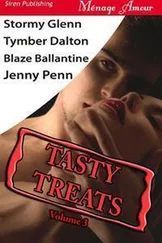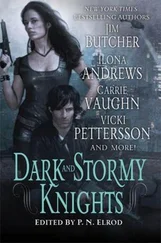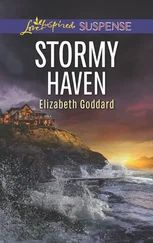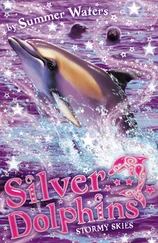She shut off the engine. The tall exhaust pipe was hot and steam curled around it. She heard something overhead like a freight train passing but it was a sustained sound that reverberated in millisecond waves, like immensely amplified radio static, so loud she could not think. It was the strangest thunder she had ever heard. It was hostile and full of incoherent buzzes and it went on and on and on. She sat stock-still on the John Deere, listening.
Ross walked across the field to her, with long strides across turned earth. He appeared out of the dense fog, indistinct at first and then solid, with edges. She lifted one hand to him with the other resting on the metal steering wheel. He touched his hat brim and then lifted a hand in return. And then as he walked he bent down and picked up something from the ground and then came on.
He came up to her and shoved his hands in his canvas coat pockets. He regarded the tractor. “What are you paying for gas for that thing?”
She smiled at him and tipped her floppy hat. “Thirteen cents a gallon, just like everybody.”
“You need to go fill out forms for an agricultural exemption.” He handed her an envelope. “Ten percent of a match race.”
“Hey!” She opened the envelope and took out three twenty-dollar bills. “Sixty dollars!” She stared at it for a moment and with a feeling of great joy realized they could pay off this year’s taxes entirely. She waved the bills in the wet air. “Ross, I am a betting fool. Who did he run against?”
“Little Badger. After this he’s going to qualify on the official tracks.” He watched her count the money over twice, and then stuff it into her jacket pocket and turn her face to him with a wide smile. “Let’s get this tractor into the barn,” he said. “It’s looking strange. The weather looks strange.” He reached for her hand. “Let me drive.”
Jeanine rode behind him on the drawbar and held to his waist as they banged over the rocky ground, through the fog. She turned her head to one side and laid her cheek on his back, her arms around him. He drove uphill in the general direction of the house; they could not see far through the fog and things came at them in blurs and then with details out of the circumscribed world. Then small bits of ice began to fall through the mist and ping on the metal surfaces of the tractor. They were no bigger than a pinhead and perfectly square. The strange thunder sounded again. She felt as if the hair were rising on her arms.
“Damn, what is this?” he said.
“I don’t know,” said Jeanine.
“You should have had sense enough to get in, Jeanine,” he said.
He drove straight into the barn fairway and turned off the engine and they both got down. Just beyond the barn entrance the fog turned and swirled, the tiny ice grains pinged. Far away Jeanine could hear a car on the farm-to-market road. They sat and watched out the opened bay doors to the draining sky and the fields in their long descending slopes to the Brazos River disappearing now in stacked planes. She watched a flight of pigeons tilting through the barn; they came to rest on a crossbeam and settled their wings with a clattering sound. The buzzing thunder sounded again and again. They listened with lifted faces.
“What is it?” she said.
“I don’t know. But you should have gotten out of the field.”
“I wanted to get it all cleared, Ross. For hay.” Jeanine spread her hands wide, as if a crop of coastal hay would grow up between them. “Abel could get a hay crop out of it if I cleared the seedlings.”
“You worry a lot, Jeanine.” He rested his forearms on his thighs. He was not much more than thirty years old and he was worn already by the nature of his work and all the work he had in front of him every day when the sun came up. The thought of clearing a field for a hay crop seemed to be too much at the moment. He smiled at her. “It will wear you out. That tractor is hard to drive.”
“There’s plenty to worry about,” she said. “Ain’t there?” They sat down on the old sugar-mill grinding stone and the fall of tiny ice grains stopped suddenly, and then the strange thunder faded away. “I wish there wasn’t.”
“What was the best time of your life, Jeanine?” Ross turned over a white object in his hand. “When you weren’t worrying. Or getting strangled.”
She pulled off the old hat and ran her fingers through her hair. “Well, let me see.” She could think about it, now that she had sixty dollars in her hands. She lifted her head to the path to the house where it turned through the gate, up to the well. She was six or seven, they had come on a visit to her grandparents. She walked down with her grandfather and her father and uncle to the barn lot in the evening, this very barn. The warm, breezy dark was full of the sound of chuckwill’s-widows calling over and over, the men leaned on the mesquite rails and talked about the plow team; she wanted to stay with them forever and hear their talk of horses. How they loved their animals. She was holding her father’s hand and the whole night sky and the air had a deep scent of horses and grass, of large warm animals and cedar. Back in the house her sisters and cousin cut out paper dolls from the catalog by the light of the coal-oil lamp but she was with the men in the beautiful darkness and it seemed to her then that the men were strong and harmless, they held the world of the Brazos valley in careful possession. This was some vanished fantasy world that children inhabit the way remote stars inhabit the night sky and form mythic figures, so immortal, so primitive. So she told him about that evening, that brief moment, as best she could although she could hardly put into words why it was so deeply moving to her. He listened with a serious expression, without speaking.
Then he opened her hand and put into it a white porcelain doll’s head. “I found that in your field,” he said.
“Where did this come from?” Jeanine turned it over between her fingers; a face of exaggerated femininity with faded black hair and red lips, broken off at the neck.
“Ask your mother. Maybe she lost it. A doll’s head.” He stood up. Then he bent down and kissed her on the mouth, his hand on her neck. It felt very good to her, sitting there on the sugar-mill grinding stone with its scent of old sweetness and his body so close. He put the fedora on her head. “Are you done for the day?”
She looked up at him for a moment and then she said, “I guess I’d better wait and see what the weather does.”
“Good idea.” His hand slid down her cheek and he hesitated but then turned to the house. “I’ll be back to rig you a chain guard.”
She walked with him to his truck, and when he drove away she ran into the house with a feeling that very bad weather was coming. She hunted around for something to eat. She sat in her dusty jeans in the empty house and ate bread and beans. Her mother was in town with Bea for a doctor’s appointment. Soon Bea’s cast could come off. She took the doll’s head to her sewing room and set it on the windowsill thinking someday she would make a body and a dress for it. She brushed out her wet hair and thought about Ross, and then went to the hall mirror, and wished she had looked a little better when he drove up. Then she realized she had not asked Ross what was the best time of his own life. It would probably have been a time with Miriam, she thought. She had a hateful thought that she could end up in a competition with a dead woman and did not like herself for thinking it.
THE NEXT DAY a hailstorm came out of the northeast. Solid-looking clouds the color of ice and irises peered at the Brazos Valley over the range of Shinnery and Blanco and Crawford Mountains, full of the immense voice of thunder and stitched with lightning. Bea was sitting up at the kitchen table, studying the odd habits of other nations for her social studies class. Hitler occupied Austria without resistance, and in the distant hiss of radio static CBS set up a thing called a news roundup with an announcer named Edward R. Murrow reporting from London.
Читать дальше












